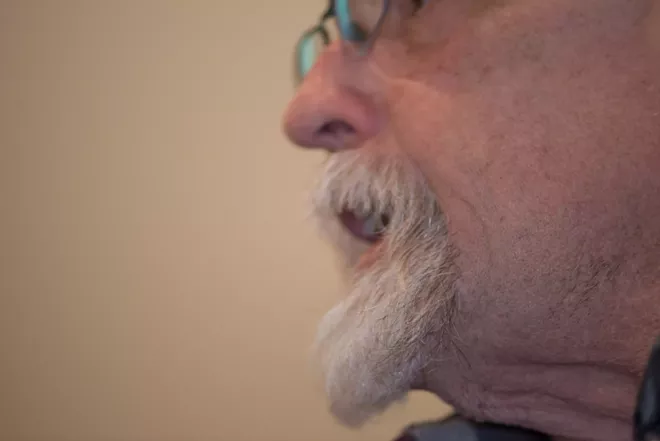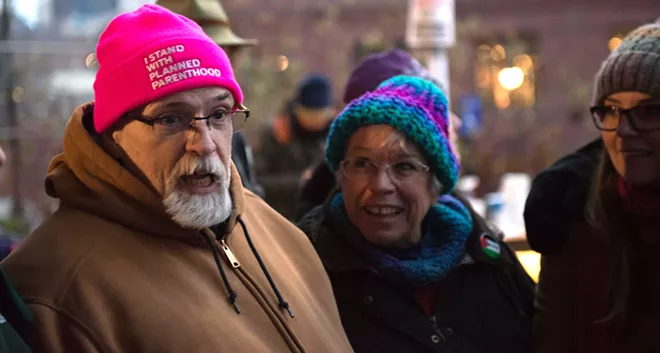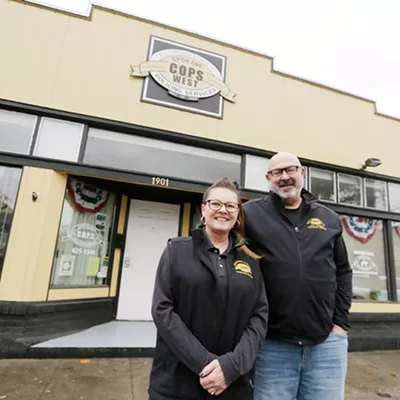Few local public officials or agencies have escaped the ire of Alfredo LLamedo, the activist whose hunger strike last month led to the Camp Hope homeless encampment outside of Spokane City Hall. In the last year, City Council President Ben Stuckart has gaveled meetings to a halt twice as LLamedo has accused the City Council of "bullshit" for not caring enough about the homeless.
"Czar Ben Stuckart has danced with the 1% for too long," he writes on Facebook.
To LLamedo, some members of the Spokane Police Department are "PIGS" and "heartless assholes," while the police chief is the "commander of the Grinch's sausages wrapped in blue."
"Happy f—-ing holidays..." LLamedo writes on his Facebook page. "I hope you all have the most tragically miserable holiday season ever as a result of KARMA biting you dead in your sickening asses!!!"
To LLamedo, the downtown business organizations — like the Downtown Spokane Partnership, which has supported the city's law barring people from sleeping or sitting on downtown sidewalks — are awful. He slams the Salvation Army and the Union Gospel Mission — two major social service agencies — while accusing them of discriminating against the LGBTQ community. (Last year, the local Salvation Army said it was its policy not to discriminate, but the Union Gospel Mission said, of transgender people, "we can’t serve everyone.”)
And while he's usually praised Catholic Charities, the agency that runs the House of Charity, the downtown shelter, he takes them to task for hiring the city of Spokane's Neighborhood and Business Services Division Director Dawn Kinder, who he accuses of lying about warming center hurdles in this week's Inlander article.
It's an issue that LLamedo himself has struggled with. Between the time that LLamedo started his hunger strike and when he was arrested by police as they dismantled "Camp Hope," LLamedo had his own crisis of faith. There was a moment where he was the one being accused of not truly caring about homelessness.
It shook him to his core. And he had to decide what, exactly, to do about that.
Initially, Alfredo LLamedo's hunger strike began on Nov. 12 with a single goal: Push the city of Spokane to suspend its sit-lie policy — prohibiting sitting and lying on downtown sidewalks — at least until there was more shelter space available.
He said he did an evaluation of all his previous protests and rhetoric. He felt that little progress had been made. He wanted to do something a little more drastic.
"You had all those prison inmates who decided to go on hunger strikes," LLamedo recalls thinking. "In many cases, they got what they were looking for. It achieved quite a bit through the hunger strikes. If it worked for them, maybe it will work me."
So for a week, LLamedo sat outside in the cold in front of City Hall, surviving on broth, protein drinks and Gatorade. It started out with just him. But gradually, a number of homeless people joined him. It turned into an impromptu homeless camp.
His protest appeared to work. Within a week, the city voted on an emergency ordinance to temporarily suspend the sit-lie ordinance until enough shelter space could be opened.
"Thank you for sending me home," a wizened LLamedo told the City Council. "But there's a lot of folks that I've been spending the nights with out there. I certainly hope that because I am leaving that those folks aren't harassed and moved off this property."
The campers out front of City Hall didn't leave. Instead, the camp began to grow. Community members Sharon Smith and Don Barbieri donated money to purchase discounted tents at the General Store.
And after a few days of recovery, LLamedo returned to the camp. A new plan for shutting down Camp Hope was developed.
"As beds become available, Alfredo will start dismantling the camp section by section and having residents take advantage of the warming centers," Joan Medina, of
LLamedo recalls outlining a similar plan in a meeting with city officials. And true to his word, as new warming centers started opening up, LLamedo says he tried to start dismantling the camp, starting with the most recently added tents. He didn't anticipate the heated reaction he got.
"They were not ready to give up," LLamedo says.
He says he was insulted and threatened.
"'Anybody comes close to me and that includes you, I’ve got
It wasn't the first time he'd had that kind of interaction at Camp Hope. Several days earlier, he recalls, he asked a young homeless person to not sleep on the steps in front of City Hall, lest they anger the city fire marshal and get the camp shut down. The kid unsheathed a big hunting knife in response, LLamedo says.
That time, LLamedo says, he had five other Camp Hope guys back him up. They convinced the young man to sheathe the knife, calm down, and just sleep.
"That kid slept like 14 hours," LLamedo says. "Just laid there."
But when he was trying to dismantle Camp Hope, LLamedo was hit with the same accusation that he's leveled against a number of public officials: that he didn't really care about the homeless.
"I had a person tell me you don’t know what it’s like to be homeless. You don't care about us," LLamedo says. "You have a home to go to."
To LLamedo, that accusation cut deep. He says it was wrong. He lost his mother when he was only 11. He started running away from home a few years later. He jumped from foster home to foster home. He's been homeless, off and on, all of his life. And by one definition, he's homeless today. He doesn't have a home of his own. He's crashing at his daughter's house.
To LLamedo, the reaction felt like he'd been stabbed in the back. He left Camp Hope, feeling discouraged and defeated. On Dec. 3, he posted a quote on Facebook, saying, "The saddest thing about betrayal is it never comes from your enemies."
LLamedo says he's had a history of deep bouts with depression.
"What my depression always led me to was suicide attempts," LLamedo says. "I’ve been there many, many times."
And, for a few days, his departure from Camp Hope landed him back in a very dark place.
"My mind, heart, body & soul are broken. I do not want to talk, I do not want your sympathy, I do not want anything other than to be left alone!!!" LLamedo wrote on his Facebook page. "I am fighting for my own reason to want to stay alive and at this
This time, however, he says he had the psychological tools to deal with his ugly thoughts. A therapist had taught him cognitive behavioral therapy, a technique of recognizing what internal thoughts are destructive and irrational and pushing back against them.
A few days later, LLamedo concluded that he'd screwed up.
"I had to have a pull-your-head-out-of-your ass moment," LLamedo says.
He summarized it in a Facebook post earlier this week:
It's like raising a young child. You nurture it, guide it, and love it with the hope that it will blossom and flourish. When I agreed to start dismantling Camp Hope, although well intentioned, I made a significant mistake. I decided the future of people without consulting them. Even though my intentions were to slowly dismantle Camp Hope from the beginning as the warming centers opened, the residents of the camp felt like I betrayed them and lashed out at me, with good reason because I had not given them the option to contribute to their own destinies.
He walked back up to the camp, admitted he was wrong, that he should have consulted them first.
"That was hard. That was hard," LLamedo says. "I hate doing that."
He says one of the Camp Hope residents gave him a big hug. He shared his story with the woman who said he didn't really care about the homeless. He told her she had every right to be upset with him.
And he says the Camp Hope residents said they wanted to stay instead of leaving. It set the stage for Saturday's "chain-gang" protest, Sunday's arrest of LLamedo and another protestor when police cleared the camp, and Monday night's confrontation with the Spokane City Council.

At Monday's City Council meeting, LLamedo fervently objected to the Downtown Spokane Partnership's strategy of snagging early public forum speaking slots. He interrupts the meeting, while one of the other activists, Dustin Jolly, yells twice that "homeless rights are human rights" and "human rights are homeless rights."
"BULLSHIT!" LLamedo yells before being escorted out. "You people suck."
But that wasn't the strategy employed by some of the other Camp Hope activists in attendance, like Joan Medina and Marianne Torres. Even within the Camp Hope group, there's disagreement about which tactics are effective, which are disruptive, which advance the agenda and which ones harm it.
LLamedo knows he has a reputation as the "big-mouth guy" who tells everyone to "go f—- themselves." As a former social worker, he says that a lot of his people in the social work profession have told him that he's going about things the wrong way. Some, he says, won't even talk to him anymore.
But he says his tactics are an intentional strategy, not just an outburst of anger. He says that he used softer tactics for years. He would focus on facts and anecdotal stories. He would compile thick stacks of research and give it to the council. But he says that got him nowhere.
"When you stand up and you tell somebody to their face, 'bullshit, bullshit, bullshit', everybody is like 'What the hell?'" LLamedo says. "What is he doing? It makes people stop and think."
He says his tactics this time around have been successful — that it's put a lot more of the spotlight on the issue than it would have had otherwise.
And it's not over yet. The Camp Hope movement has evolved, taking up the slogan "Camp Hope is Everywhere." In other words: Camp Hope isn't just a place. It's an idea.
Lately, LLamedo has been making Facebook posts announcing that "The REVOLUTION begins!!!" this Monday at 6 pm at Spokane City Hall.
He writes about targeting
specific downtown businesses, including banks, hotels, stores
On Monday, DSP President Mark Richard and others spoke in defense of the sit-lie ordinance, arguing that it’s an effective way to connect homeless residents with the community court system.
“Our organization too is a loving organization. We have a loving city,” Richard said “We all care and love for our homeless. How do we work together in holistic ways to provide resources? I’ve worked arm and arm with you to create new programs, to create new funding, to help our people in need.”
But Richard also argued that there were people on the street who had refused help.
But LLamedo argued that the DSP was vilifying the homeless, that they only cared more for profits than people.
"It's time to take our fight for social justice for persons that are homeless to the doorsteps of those who would brutalize them further!!!" LLamedo says.
So what does he mean by "revolution"? For now, LLamedo is keeping it vague.
"By 'revolution,' it will be a revolution," LLamedo tells the Inlander. "We’re not going to destroy property. We’re not going to do anything that is illegal. But there will definitely be actions that will be very disruptive. And things that will impact the DSP and the downtown businesses, especially now in the Christmas season."
Richard was not immediately available late Friday evening to provide a response to LLamedo's plans.




























